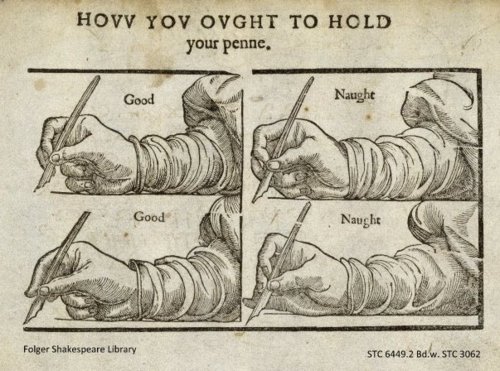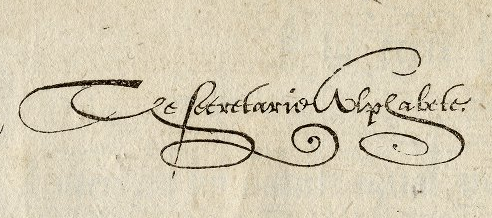| Robert Matz Office: College Hall 100a Email: rmatz@gmu.edu Office Ph. #: 993-5317 home page: http://mason.gmu.edu/~rmatz Group Page (for class members) |
ENGH 630.001 R 7:20 – 10:00 pm Research Hall 201 Spring 2014 Office Hours: R 6 – 7 pm, or by appointment |
 Writing in the Renaissance–both literal penmanship and the writing of poetry–was a moral act, an expression, in every sense, of character. It was a world of “good” and “naught” models on which one was supposed to model oneself and model for others. Nonetheless, and often in tension with this technical and moral stricture, writing was a realm of freedom and imagination. The flourish was a common feature of Renaissance handwriting. In this class, we’ll read Renaissance poetry–and theories of poetry–in terms of this tension and others, including writing as truth or fiction, masculine or feminine, serious or silly, English or classical. And exploring poetic technique, we’ll consider how an educational culture based on the teaching of writing produced the brilliant outpouring of poetry in Renaissance England. Authors studied include Wyatt, Sidney, Marlowe, Spenser, Donne, Jonson, Lanier, Herrick, Herbert, Marvell, and Milton. With a group of fantastic poets from both the sixteenth and seventeenth centuries, the course also provides an introduction to Renaissance poetry.
Writing in the Renaissance–both literal penmanship and the writing of poetry–was a moral act, an expression, in every sense, of character. It was a world of “good” and “naught” models on which one was supposed to model oneself and model for others. Nonetheless, and often in tension with this technical and moral stricture, writing was a realm of freedom and imagination. The flourish was a common feature of Renaissance handwriting. In this class, we’ll read Renaissance poetry–and theories of poetry–in terms of this tension and others, including writing as truth or fiction, masculine or feminine, serious or silly, English or classical. And exploring poetic technique, we’ll consider how an educational culture based on the teaching of writing produced the brilliant outpouring of poetry in Renaissance England. Authors studied include Wyatt, Sidney, Marlowe, Spenser, Donne, Jonson, Lanier, Herrick, Herbert, Marvell, and Milton. With a group of fantastic poets from both the sixteenth and seventeenth centuries, the course also provides an introduction to Renaissance poetry.
 Required Texts
Required Texts
Sidney’s the Defence of Poesy and Selected Renaissance Literary Criticism (RLC)
The New Oxford Book of Sixteenth-Century Verse (SCV)
The Faerie Queene: Book Six and the Mutabilitie Cantos
Seventeenth-Century British Poetry, 1603-1660 (SCBP)
Samson Agonistes and Shorter Poems
Essays and other short readings are available on line on our group docs course readings page (for material covered by copyright) or as a link on this syllabus (for open web material). Unless you can take marginal notes electronically, please print out all electronically available material; read it in hard copy and bring that hard copy to class. You may find it convenient to buy a binder or separate folder to organize this material and bring it to class.
Course requirements
Class participation, weekly participation in our commonplace book, a close reading (5-7 pp.), a presentation on a scholarly essay or book chapter, a prospectus (1p.) an annotated bibliography and a final paper on a canonical poet we’ve read in relationship to another, less well known early modern poet (15-20 pp.)
Course Schedule (subject, with warning, to change)
| Date | Readings | Events | ||||||||
| Jan. 23 | Course Introduction | |||||||||
| Jan. 30 |
|
|||||||||
| Feb. 6 |
|
Close Reading Assigned | ||||||||
| Feb. 13 | No Class | |||||||||
| Feb. 20 |
|
Close Reading Due | ||||||||
| Feb, 27 |
|
1-Page Prospectus Assigned | ||||||||
| March 6 |
|
Annotated Bibliography Assigned | ||||||||
| March 13 | No Class–Spring Vacation | |||||||||
| March 20 |
|
|||||||||
| March 27 |
|
|||||||||
| April 3 |
|
1-page Prospectus Due | ||||||||
| April 10 |
|
Annotated Bibliography Due | ||||||||
| April 17 | Conferences | |||||||||
| April 24 |
|
|||||||||
| May 1 | Paper Exchange / Wrap Up | First Version of Term Paper Due | ||||||||
| May 8 | No Class | Final Paper Due | ||||||||
| Other important dates: Wed. Jan 29: Last day to add classes and last day to drop with no tuition penalty Tues. Feb 11: Last day to drop with a 33% tuition penalty: Fri. Feb 21: Final Drop Deadline (67% tuition penalty) |
||||||||||
Course Policies:ReadingsThe readings for each class are due on the date listed above. Approach each assignment actively by always reading with a pen or pencil in hand. Note words, phrases or sentences that interest you, that seem significant in the context of the work, or that you have questions about. Jot down in the margins any questions or ideas you have about a particular point or the work as a whole. This practice will help you come prepared to discuss the readings in class and get the most out of class discussion; it will also help you become a more skillful reader of literary texts in general. Participation and AttendanceThis class is a seminar. I may occasionally lecture for a portion of a class, but we will generally open up class time to discussion, to observations about the ideas in a text, about its style, its uses of language, its puzzling qualities. Students are expected to attend each session of class and to participate in class discussion. Attendance and class discussion will be a portion of your overall participation grade. Course commonplace bookThat writers are also readers is true at any time. During the Renaissance, the reading of writers and the writing of readers manifested itself not only in published poetry, but also in the “commonplace book,” in which authors copied out poetry, prose, “sentences,” recipes, and their own thoughts. They also shared their commonplace books, and hence added their own responses to those of others. For this assignment, each student will take the lead for one week. By the Tuesday before class each week, the leader will create a topic in our class forum and post a few key quotes and discussion questions. By class time on Thursday, the rest of you should post replies and, when relevant, references to other passages and material. Then, by the following Monday the previous week’s leader should post another paragraph or two summarizing and commenting on that week’s posts. Evaluation of this assignment will be determined by your active and thoughtful contribution to the commonplace book. PresentationsEach student will be once responsible for providing a presentation on one additional essay or book chapter about the day’s reading. The presentation should cover three areas: a summary of the selection’s argument, its relevance to the day’s primary and possibly secondary texts, and an account of why you picked this selection (some possibilities: the selection seemed to take a very different point of view than the assigned secondary reading, or work by a very different methodology, the essay appears seminal in discussions of the primary text(s) or author involved, the essay appears to you to be especially penetrating or expansive in its implication). The presentation will be evaluated according to how well it covers these three areas. Paper DeadlinesPlease hand in assignments in on time. Late assignments will be graded down a half grade for each day late. I’ll grade the term paper based on the final version only, but I will mark it down a half grade if a complete first version is not ready for the paper exchange on May 1. PapersPapers should be typed with standard margins, spacing and type size. They should be carefully proofread and neatly presented. Please number your pages.
Please note: I encourage you to write about any primary text on the syllabus. If you have an idea about what you’d like to write about, you might want to see me for help figuring out what text would be appropriate for your topic. I also request that your essays in some way address the central concerns of the course. Paper HelpsSome feedback from me and other students will be built into the structure of the course. I encourage you, however, to see me at my office at any time. When we meet, it’s best to have a draft of the paper you are working on. This will give us something more concrete to talk about. There is also available a Writing Center at Robinson A116 that can provide you with further individual attention to your writing. I encourage you to take advantage of this excellent facility. I would also suggest that you give yourself plenty of time to work. Start early! PlagiarismYou must cite, using a standard citation format, all the articles, books or other sources that your own writing draws on, either directly or indirectly. Such sources include (but are not limited to) introductions to editions of the texts we’re reading, any kind study aid and resources found on the internet. Also note that uncited sources will constitute plagiarism even if they ended up in your work without your conscious knowledge (e.g. you forgot you read the material; you confused your own notes with notes on a source), since part of the scholarly responsibility that comes with using secondary sources is keeping track of which words or ideas were yours and which came from a source. I will take all suspected cases of plagiarism to the Honor Committee. Students with DisabilitiesIf you are a student with a disability and you need academic accommodations, please see me and contact the Office of Disability Resources at 703.993.2474. All academic accommodations must be arranged through that office. GradesGrades will be derived as follows:
A Specific, complex and/or striking thesis, thesis developed without digression through the course of the paper, consistently precise, sensitive and/or striking interpretations of the text, crafted prose, no major mechanical problems B Specific thesis, thesis generally developed through the course of the paper, consistently good interpretation of text, competent prose, minor mechanical problems C Has a thesis, but one that needs greater specificity or complexity, thesis developed with some digression or repetition, some good interpretation, some mechanical problems D Very general thesis, thesis development digressive or repetitive, plot summary or thoughts/speculations not based on textual evidence, major mechanical problems F No thesis or thesis development ADDITIONAL CRITERIA FOR RESEARCH IN TERM PAPER A Paper astutely frames and develops or critiques current critical discussion of its topic. Paper includes a range of top relevant critical, historical and/or theoretical analyses to support its points B Paper includes current critical discussion of its topic. Paper contains a range of relevant critical, historical and/or theoretical analyses to support its points C Paper includes critical discussion of its topic but its own argument does not clearly relate to that discussion. Secondary sources in the paper are of low quality and/or lead to digression from the paper’s focus rather than supporting it. D Few secondary sources; secondary sources not relevant to the argument of the paper F No secondary sources Best wishes for the semester. I look forward to meeting you. |
||||||||||